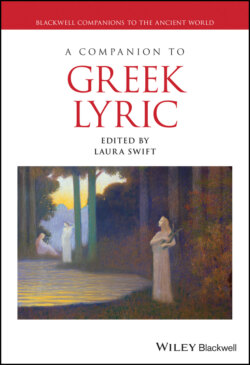Читать книгу A Companion to Greek Lyric - Группа авторов - Страница 23
Archilochus’ Telephos Elegy
ОглавлениеIt was a great surprise when a fragment of Archilochus was revealed on a bedraggled Oxyrhynchus papyrus which was neither iambic nor (overtly) parodistic but was, in fact, a fragment from a poem very much in the manner of the last we have been discussing by Simonides: a long narrative poem in elegiac meter.58 The fragment has come to be known as the “Telephos Poem,” as its main feature is a battle between Telephos, son of Herakles, and the Greek force against Troy, which has landed in Mysia by mistake: Telephos routs the unfortunate Danaoi more or less single-handed, it seems. But this basic narrative has, again, very clear religious import. In the first place there is the same quasi-sacred status of heroic epic:59 here the routing of the half-gods who fought before Troy is used as a paradigm to comfort some person(s) who have obviously fled in battle. There is no shame when greater men than you fled before one man! is the basic paraenetic message. This is reinforced by saying that one cannot withstand “divine necessity”; the text is incomplete but it seems to be saying “When [the opponent] is driven by the strong compulsion of a god, one should not speak of weakness and cowardice.”60 The poet repeats this point in line 7: “to such an extent the fate of the gods cast fear [sc. on them], although they were brave spearmen.”61 We note other touches which emphasize the elevated sacred nature of the epic paradigm: the fleeing Greeks are themselves “sons and brothers of gods” (14); their proper destiny, Troy, is a “holy city” (15); and the ground they have mistakenly trodden, Mysia, by bad navigation, is the “lovely city of Teuthras” (17).62 We see that such a paraenetic appeal to epic includes the divine apparatus familiar from Homer: the gods decide the humans’ destiny, they fight in person, in this case the son of Herakles, Telephos. What they fight for has a sacred quality: the citadel of Troy, or, here, Mysia. Probably the context is a battle in which Archilochus and his comrades fled ignominiously. “Don’t worry,” says the poet, “braver men than you have fled before just one opponent, Telephos.”63 But the human message which today we would communicate by psychology—for example, “it was the shock element which demoralized you”—is here explained in the abstract by gnomic wisdom “one can’t fight against the compelling fate of god” and by the half-god status of Herakles’ son, Telephos, and his father Herakles, who eggs him on.64
